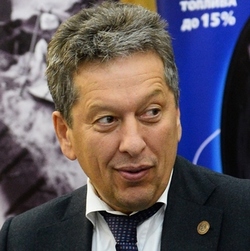Tatneft grows using old yeast
The Tatarstan oil company increases profit by 13% in the first half of the year
Tatneft closed the first half of 2017 with a growth of main financial indicators. The revenue increased by more than 20%, and the profit — by nearly 13%. It is last year's increase in oil production helps the company to grow. The commitments for reduction adopted in the framework of OPEC agreement will be purely technical for Tatneft. Read details in the material of Realnoe Vremya.
Last year's oil ''warms up''
Tatneft has reported on financial results under Russian Accounting Standards (RAS) for the first half of 2017. The key indicators increased, according to the report. The company's revenue in January-June increased by 21,1% and amounted to 274,14 billion rubles. The gross profit also increased by 12,6% to 94,44 billion rubles. The net income amounted to 57,4 billion rubles, increased by 12,9%, or 6,55 billion rubles.
However, the cost of sales also significantly increased. It increased by more than 37 billion rubles, reaching 179,7 billion rubles. But other costs decreased by 9,5 billion rubles, it is clear from the report.
We will remind, at the end of 2016, the financial indices of Tatneft also increased: the revenue — by 5% (up to 486,2 billion rubles), the profit — by 23,3% (up to 104,8 billion rubles).
 According to Vasily Tanurkov, deputy director of group of corporate ratings of the Analytical credit rating agency (ACRA), the growth continues due to the increase of oil production in the second half of last year. This increase, he says, is still reflected in the figures. In 2016, Tatneft produced 28,7 million tonnes of oil — by 5,3% more than a year earlier.
According to Vasily Tanurkov, deputy director of group of corporate ratings of the Analytical credit rating agency (ACRA), the growth continues due to the increase of oil production in the second half of last year. This increase, he says, is still reflected in the figures. In 2016, Tatneft produced 28,7 million tonnes of oil — by 5,3% more than a year earlier.
At the same time, the costs for production decreased by 4,2% due to improving oil recovery, said in last year's report of the company. In September 2016, the company announced that it planned to increase investments in exploration and production in the second quarter. Tatneft was going to allocate 33 billion rubles for this purpose, it is by 18% more than in January-March 2016.
In the future, says Tanurkov, the rates may be affected by the consolidation by Tatneft of the bank Zenit. In June, the company brought the share of the captive bank up to 71,89%. About the intentions of Zenit to issue additional shares was known at the beginning of 2017. Later, it was revealed the investor. It appeared to be Tatneft — in March, the Federal Antimonopoly service allowed it to buy another 41,7% of Zenit.
OPEC is not a hindrance for production
As for reduction of production within the OPEC agreement, for Tatneft it will be solely technical. The production will be limited in relative to the level of October of last year (the agreement on the reduction was concluded in November 2016). Just the period October-November coincided with peak production within the year. Therefore, even at the end of 2017 the volume of production of Tatneft will remain high.
The management of the company is sure in the same thing. At the end of June at the annual meeting of shareholders, Director General of Tatneft Nail Maganov said that the decision by OPEC remain in force, but the company's profit will not be affected. ''When we made the decision on reduction of production, we debated a matter in mind for ourselves. One of the grounds for reduction was an increase in oil price. We believe that the operating performance of the company will remain unchanged,'' he said.
 Already in July Maganov said that Tatneft can increase production after termination of the OPEC agreement. ''Yes, we can increase production. We can do it fast enough. The only question is: we will need to assess whether it is worth bearing such risks or not, what price (of oil — editor's note) will be by this time,'' he said to Interfax.
Already in July Maganov said that Tatneft can increase production after termination of the OPEC agreement. ''Yes, we can increase production. We can do it fast enough. The only question is: we will need to assess whether it is worth bearing such risks or not, what price (of oil — editor's note) will be by this time,'' he said to Interfax.
Then the situation will depend on whether OPEC members decide to renew the contract. However, in 2018 the financial results of Tatneft to a greater extent will depend on the commissioning of new refining capacity, believes Tanurkov.
A year ago, TANECO JSC (part of Tatneft group) launched a delayed coking unit with annual capacity of 2 million tonnes of raw materials. At its expense, TANECO plans to increase conversion rate up to 95%, abandon production of dark oil products and reach ''zero mazut''.
Not income, but stability
Kommersant has recently reported about the plans of Tatneft to press the major oil companies in the field of public procurement. According to the newspaper, President of Tatarstan Rustam Minnikhanov sent to Prime Minister Dmitry Medvedev the letter with the request to include Tatneft in the list of the only suppliers of petroleum products for the Ministry of Defence. Tatarstan combustive and lubricating materials meet all current and future requirements, noted Minnikhanov.
However, the companies have no special benefit from these supplies to Tatarstan, says Tanurkov — the supply for the Ministry of Defence are not more profitable than others. ''Now Tatneft sells all that it processes, and refining capacities are loaded. It is only a guaranteed demand. From this point of view, it can be not interested. It will not affect operational performance, but it will affect stability,'' said the expert.
In the Tataneft press-service at the time of publication the query of Realnoe Vremya was not responded.